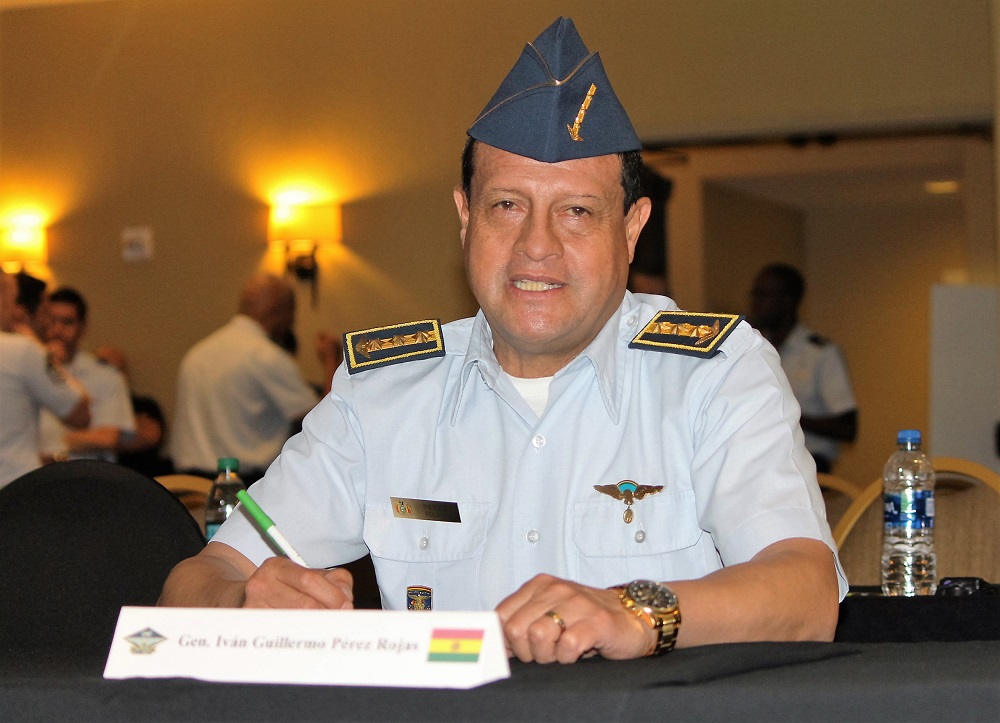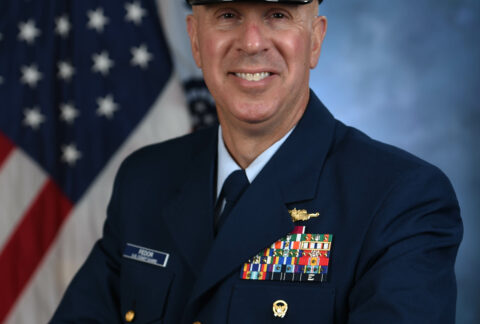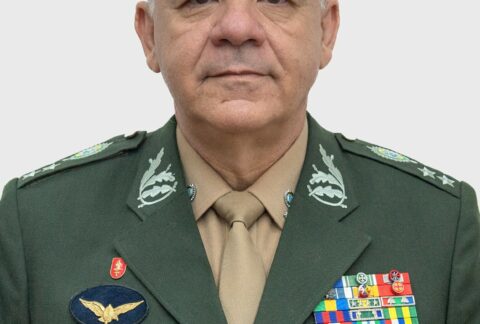The Bolivian Air Force works on a new integrated radar communications system for the security of its airspace.
Major General Iván Guillermo Pérez Rojas, commander of the Bolivian Air Force (FAB, in Spanish), has a very clear vision of how to develop the institution under his command. He aims to make FAB a national aerospace defense entity by 2019. A new and modern integrated radar, communications, and technology system will allow the institution to reach that milestone.
Diálogo interviewed Maj. Gen. Pérez during the Western Hemisphere Exchange Symposium held on the occasion of the 75th anniversary of the Inter-American Air Forces Academy (IAAFA) in San Antonio, Texas, March 14th–16th. The Bolivian officer detailed FAB advances; his country’s radar project to detect and identify illegal aircraft; and regional collaboration on information sharing. 2019. A new and modern state-of-the-art integrated radar, communications, and technology system will allow the institution to reach that milestone.
Diálogo: Why is the Bolivian Air Force’s participation in this international symposium important?
Major General Iván Guillermo Pérez Rojas, commander of the Bolivian Air Force: During the symposium, we studied various issues of importance to our nations—common issues such as the fight against illegal flights, for example, and how each country organizes itself in response to natural disasters—which all our countries suffer from, large, small, rich, and poor alike. This symposium is very important to take away experiences that can be used in each of our systems. The best is to share lessons learned—experiences other countries had—to be able to apply them in our systems in the best way.
Diálogo: How do you see IAAFA’s progress over its 75 years of existence?
Maj. Gen. Pérez: We’re all aware that education is the most important aspect for our populations, our personnel, and our human resources. Education, being such an important base, has been promoted by this school, which, as its history shows, was founded at the request of a Peruvian general to a partner nation after World War II.
Diálogo: As an IAAFA graduate, can you tell us about your experience here?
Maj. Gen. Pérez: I took the instrument flight rating course here in 1997. I was in class 97C. It was very important because we studied with pilots and airmen from other air forces, such as Argentina, Peru, and Ecuador. It was a formative experience, as we took other courses such as leadership. Similarly, we were able to share our own professional and life experiences and build friendships with everyone. For instance, the current commander of the Guatemalan Air Force, [Brigadier General Timo Hernández Duarte] was in my class, and here we are now, meeting again after 21 years. Those were very important experiences because they were applied in our profession, they trained us, and from what we learned, we created educational courses in our own air forces that have been very important in our careers.
Diálogo: Did you ever imagine, during your time as a student here, that 21 years later you would be the commander of your country’s Air Force?
Maj. Gen. Pérez: No, I didn’t, but I think that each of us fights to achieve that goal over in their careers. Actually, there’s constant competition in all armed forces and air forces, and it was a constant struggle and a great effort to get to this position. Back in those days, I only thought of what it would be like to fly and serve in the role of aviator.
Diálogo: During the Bolivian Air Force’s presentation at the symposium, there was some discussion about your national radar project. Can you elaborate on that?
Maj. Gen. Pérez: Public Law 521 provides for the creation of an Airspace Security and Defense Command and a project for an Integrated Air Defense and Air Traffic Control System. This system includes control of both civil and military airspace: on the civil side, through regular air traffic control for flights inside Bolivian airspace, and the Bolivian Air Force–on the military side–has control over the military radar system. The idea is that, if an illegal flight occurs in the civil system or if the flight is found to be irregular, it will be transferred to us, and we’ll do all the tracking using the military radar system.
Our government chose this radar project to help with regional security in the control of airspace. This project is very important, as it will be in full development in 2018. By mid-year [2018], several radars will be installed, and we’ll have more consistent control of our airspace. It’s expected that the entire system will be fully operational in 2019. We hope to be able to contribute to the regional security needed, especially in terms of illegal flights.
Diálogo: How does the Bolivian Air Force work with other forces in the region to help address the scourge of narcotrafficking and other transnational threats?
Maj. Gen. Pérez: It’s not just in the area of narcotrafficking. We talk about illegal flights because they include narcotrafficking, human trafficking, the smuggling problem, and other issues. For instance, we carried out combined exercises with our air assets with Argentina and Peru, transferring information from their radar systems to our system. Once our system is complete, we’ll also be able to share that information so that they can take actions that are within their own procedures.
Diálogo: Will this new technology allow information to be shared in real time?
Maj. Gen. Pérez: Yes, in real time. We already did this using their systems, and they’re now waiting for our system to be up and running so that there’s a mutual exchange of information.
Diálogo: What is the biggest security challenge in your country, and how does the Bolivian Air Force help deal with it?
Maj. Gen. Pérez: Currently, the greatest challenge that the Bolivian Air Force faces is getting our radar system up and running so that we can control our airspace, as well as getting the resources to exercise total control over our borders.
Diálogo: Is terrorism a threat to your country?
Maj. Gen. Pérez: Not currently, but there is no doubt that it could become a threat. For now, illegal flights, narcotrafficking, and smuggling are the latest threats and the ones we have a greater influence on.
Diálogo: One of the issues also addressed at the conference was humanitarian aid and disaster response. How is the Bolivian Air Force doing in that regard?
Maj. Gen. Pérez: We have a system that works just like in other countries. It’s connected to the System of Cooperation Among the American Air Forces (SICOFAA, in Spanish). IAAFA is part of SICOFAA, meaning it’s SICOFAA’s educational arm, and the Bolivian Air Force has not separated from that arm. When SICOFAA is activated, we all join in. For instance, when an earthquake struck Ecuador in 2016, we went there to help, sending in humanitarian aid and the Bolivian Air Force’s specialized Search and Rescue Group, which has dogs trained to search for victims in that kind of disaster.
Diálogo: Another issue discussed here was the importance of working together to solve joint threats. What can you tell us about that?
Maj. Gen. Pérez: Working together creates new capabilities and potential. We should always work on issues affecting the region and the security of states, such as illegal flights, narcotrafficking, terrorism, and narcoterrorism. By joining our air forces to control our airspaces, we’ll contribute to that security. And of course we do that. When systems are improved, you get better information and have greater capacity to deal with threats. It’s like having one sibling versus many, for instance. When you’re home and you only have one brother, you say, ‘I only have one brother.’ But, when you have 10 brothers, you say, ‘I can do many more things. I can achieve many more goals with everyone’s collaboration.’
Diálogo: How does the Bolivian Air Force support the role of women within its ranks?
Maj. Gen. Pérez: For more than nine years, we’ve embraced the role of women in the Air Force. We have officer graduates, women pilots who trained at our institutes and currently carry out the same duties as any other aviator in the Bolivian Air Force.
Diálogo: What was this change like within the organizational culture of the Air Force?
Maj. Gen. Pérez: All changes always present some difficulties that must be overcome. The culture has been changing, and we’re soldiering on through the process. The government now instituted voluntary military service for women. Through such recruitment, women already started joining to do voluntary military service throughout the armed forces.
Diálogo: What message do you have for the other air forces of the region?
Maj. Gen. Pérez: That we should always work together, lend each other a hand, collaborate, and transmit the information that is so vital for decision-making.









